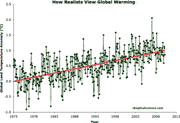An Open Letter to the Future
Posted on 20 March 2012 by climatesight
This is a re-post from Kate's ClimateSight blog
To the citizens of the world in the year 5000:
It’s 2012, and nobody is thinking about you.
These days, Long Term Thinking means planning for 2050, and even that is unusual. Thoughts of Future Generations don’t go beyond grandchildren. If my government knew I was thinking about people three thousand years in the future, they would probably call me a “radical”.
However, three thousand years isn’t such a long time. The ancient Greeks flourished about three thousand years ago now, and we think about them all the time. Not just historians, but people in all walks of life – scientists, policymakers, teachers, and lawyers all acknowledge the contributions of this ancient civilization to today’s culture. Our society is, in many ways, modelled after the Greeks.
I was walking outside today, at the tail end of the warmest winter anyone can remember in central Canada, and thought to myself: What if the ancient Greeks had caused global climate change back in their day? What if they had not only caused it, but understood what was happening, and had actively chosen to ignore it? The effects would still be apparent today. Global temperature might have stabilized, but the biosphere would still be struggling to adapt, and the seas would still be gradually rising. What would we think of the ancient Greeks if they had bestowed this legacy upon us? Would we still look upon their civilization so favourably?
The Golden Rule is usually applied to individuals living in the same time and place, but I think we should extend it across continents and through millennia so it applies to all of human civilization. Before we make a major societal decision, like where to get our energy, we should ask ourselves: If the ancient Greeks had gone down this path, would we care?
The future is a very long time. Thinking about the future is like contemplating the size of the universe: it’s disturbing, and too abstract to fully comprehend. Time and space are analogues in this manner. 2050 is like Mars, and the year 5000 is more like Andromeda.
I can handle Andromeda. And I can handle the concept of 5000 A.D., so I think about it when I’m outside walking. My first thoughts are those of scientific curiosity. Tell me, people in 5000 – how bad did the climate get? What happened to the amphibians and the boreal forest? Did the methane hydrates give way, and if so, at what point? How much did the oceans rise?
Soon scientific curiosity gives way to societal questions. Were we smart enough to leave some coal in the ground, or did we burn it all? Did we open our doors to environmental refugees, or did we shut the borders tight and guard the food supply? How long did it take for Western civilization to collapse? What did you do then? What is life like now?
And then the inevitable guilt sets in, as I imagine what you must think of us, of this horrible thoughtless period of history that I am a part of. But with the guilt comes a desperate plea for you to understand that not everyone ignored the problem. A few of us dedicated our lives to combating denial and apathy, in a sort of Climate Change Resistance. I was one of them; I am one of them. With the guilt comes a burning desire to say that I tried.































 Arguments
Arguments






























[DB] Hot-linked URLs.